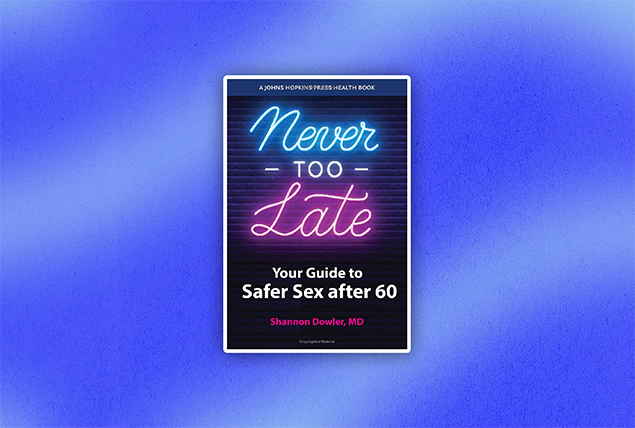Between the Pages: It's 'Never Too Late' For Safe Sex

Providing sexual education for seniors is the purpose of the new book "Never Too Late: Your Guide to Safer Sex After 60." Written by Shannon Dowler, M.D., a family physician and expert on sexually transmitted diseases (STDs), and published by Johns Hopkins Press, "Never Too Late" shines a light on a topic too many people seem willing to never think about or mention.
Given the increase in dating apps and retirement communities, adults are sexually active well into their 60s and beyond. Unfortunately, STD rates for this demographic have increased.
In this exclusive interview, Dowler, who's based in Chapel Hill, North Carolina, discusses how seniors can prevent STDs, the treatment options for chlamydia, common misconceptions concerning STDs and more.
Editor's note: This interview has been edited for length and clarity.
Please start by telling us about your background in sexual health and why you decided to write this book.
I am a family physician. I have more than 20 years in the sexually transmitted disease clinic at a health department in western North Carolina. However, my interest in sexual health dates way back to hosting a sexual health event for teenagers when I was getting my Gold Award in Girl Scouts. It became a focus for me in medical school.
I went to medical school in eastern North Carolina. At that time, HIV was turning into AIDS and killing a lot of people. The first drug had just been invented to help treat it but a lot of people couldn't access the drugs; they couldn't afford it. I saw a lot of people with really devastating infections during my medical school training, and so that just instilled an interest in me.
In residency, I did some rotations with the STD clinic at the health department and loved it, so it's just stuck with me. Even though my career has gone in lots of different paths, I've always kept an interest in sexual health and kept a presence in the STD clinic.
The book came about for a couple of reasons. One, I've done a few rap videos. The one I did around older adults, "STDs Never Get Old," went viral. It was international. I was being interviewed by people in India and all over the world. At the same time, I was noticing in my STD clinic that the people coming through the door were getting older and older. There was just a huge shift in the demographic of who we were seeing in the clinic, with more older adults coming in with lots of infections. They were really surprised by it, not understanding even what the infection was or what it meant for them.
With this combination of there being an interest in the world on this topic and seeing this pattern of increasing STD rates emerging in the older population, it seemed like the right time to write a book on sex ed for seniors. I wanted to help our older adults who maybe never had formal sex education. If they did, they certainly haven't had it in decades. It's a chance to get everybody on the same page about sexual health.
What are some factors that have contributed to the rise of STDs among the 60+ population?
There are a variety of things coming into play at once. Older adults are using technology to find partners, just like younger adults are. They're tech-savvy. These dating apps and hookup apps are helping older adults find partners. Whether they're for deep friendships or for intimacy, people are more connected than they've been in the past. We have really good pharmaceuticals and medical interventions, which mean people remain sexually vigorous longer and later in life.
We have all these retirement communities in our country, where older adults are coming together to live during their final decades, but they're healthy and active. They go out together and they do things together. If you think about dorm life when you were in college, there were all those pheromones oozing around, but you still had to go to work and go to classes and take exams. Well, in these retirement communities, there are no jobs. There are no classes. There's time and energy. I think people are more sexually active for all these factors.
Chlamydia is on the rise. What are some common signs and symptoms as well as treatment options?
Chlamydia is a really sneaky sexually transmitted infection. It's caused by bacteria, so the good news is we can treat it with antibiotics. We can treat and cure chlamydia. Unfortunately, a lot of people show no symptoms, so they'll have no sign of infection. That means they pass it on to other partners because they don't know they're infected.
Some people will have symptoms. Men may find they're feeling a bit of burning with urination. They might have a discharge, although that's more likely with gonorrhea. It's often a really subtle discharge. They might notice some crusting on their underwear. It's not super obvious like gonorrhea is.
Women might also notice an increase in vaginal discharge. But probably more than half of the people we see with chlamydia infections clinically show no symptoms. We pick it up on routine screening. It's very contagious, so it's spread with body fluids really easily.
People can get a chlamydia infection in their throat from oral sex. You don't just find it in the genital area. You'll see it in the anal area as well.
What are some common misconceptions you hear concerning STDs?
A lot of people don't realize they can get STDs in other places. They think they're safe if they don't have traditional sex, but we see infections in the throat and the anus. It's important to understand that wherever body fluids are exchanged, there's a risk of STDs.
There's also a lot of shame attached to sex and to genitals in the older demographic.
There's this idea that if you have an infection, you're dirty. And that's not the case. These infections are everywhere. Whenever body fluids exchange, there's a chance you're going to pick it up. It's not a sign of dirtiness—it's a matter of fact. You come into contact with a body fluid that has this little tiny virus or bacteria in it and now you need to treat it.
We have to move away from the sense of shame people feel when they acquire an STD. Honestly, the only shame in it is if you don't tell your partner so they can take care of themselves. Or if you don't go get screened and make sure that everything's OK preventatively.
What would be your biggest piece of advice regarding STD prevention?
Seniors are terrible about using condoms, probably because in their earlier years, they thought of condoms as pregnancy prevention. So now, they're not worried about pregnancy prevention. But it's really that barrier method that keeps body fluids from being exchanged, which can be the most important preventive measure that people can take.
Having said that, a lot of people are simply not going to use condoms or other barrier methods. And that's a choice. Honestly, if that's the choice, that's fine, but you need to be really proactive about getting screened. If you're having high-risk partners, consider going on PrEP, which is a medication to prevent HIV infection. All these things are important dialogues to have with your primary care doctor.
Having an open dialogue with your doctor about what your risks are, what your exposures are, and how you need to be screened and then appropriately treated is incredibly important.
It's essential to have dialogue with partners. A lot of people will start a new relationship and not ask, "Have you had any risky exposures?" and "Have you been screened and tested?" That should be part of every conversation before you engage in intimacy with a new partner.
Everyone should practice asking the questions aloud. I even put some examples in the book. Because my mom was reading the book before it was in the final edits, she asked me, "Shannon, how in the world would somebody ask somebody this question?" That gave me the idea of putting in some conversation starters about how people might ask those questions.


















